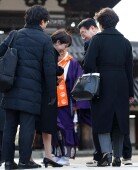[Editorial] Labor Costs
Labor Minister Yim Tae-hee said Thursday that Korea from next year will allow multiple unions at companies and ban salaries for professional union leaders, starting with state-run corporations and conglomerates. At a seminar hosted by the Korea Association of Newspaper and Broadcasting Editors on Jeju Island, Yim said, Establishing a union is a basic right, and Korea cannot afford to postpone its implementation further. He added that fewer unions will stage violent struggles even if multiple unions are allowed under the present atmosphere of co-prosperity between labor and management.
The Labor Union Act of 1997 specified a ban on pay for professional labor leaders and put the burden on reducing the number of such leaders on both labor and management. The implementation of the provisions, however, has been postponed three times. Nevertheless, the average number of paid labor leaders has increased from 2.2 in 2002 to 3.6 at a union.
Attention is on whether peaceful labor-management relations will continue as Yim predicted or if a militant umbrella union such as the Korea Confederation of Trade Unions will raise labor confrontation at many companies. Chances are high that multiple unions could compete with each other to demonstrate their commitment to labor strife. This could fuel worry over whether the Korean economy, which has barely emerged from the global financial crisis, can endure such shaky labor-management relations.
Japan Airlines, which has eight unions including those for pilots and mechanical engineers, won approval for wage cuts designed to overcome its managerial crisis. Its unions had more than 10,000 combined members in 2006. But the carrier faced resistance from other unions and its struggle to overcome its high-cost structure resulted in its managerial crisis.
In Korea, the Labor Union Act specifies that the labor minister devise measures to unify the collective bargaining channel by Dec. 31 this year. But the ministry has yet to come up with measures to do so this year, the 13th year of the delay of the acts implementation. The Lee Myung-bak administration is negligent and overly optimistic in a sense, as it plans to allow multiple unions and resolve problems later, despite worry over intervention by politically noble unionized workers who even stage campaigns to overthrow the government.
Yims perception that the government must follow principles when the situation is tougher is basically sound. Yet in a country like Korea, where militant unions easily resort to violence rather than following the rules, the government needs to more seriously think about the reality and principle that multiple unions are a basic right. If the government is serious about the principle, it will have to first implement the non-payment of wages to professional union leaders without further delay.
Unless labor and management compromise, it is uncertain whether the plan on unifying the collective bargaining channel will stabilize labor-management relations in an era of multiple unions. If Korea is to apply global labor standards, its overall perception and understanding must change, not to mention laws and institutions. The government must ensure that the national cost of allowing multiple unions and a ban on wages to professional union leaders from next year is lower than those resulting from the continued postponement of the provisions.






![[단독]정부, 석유화학 이어 배터리 구조조정 시사](https://dimg.donga.com/c/138/175/90/1/wps/NEWS/IMAGE/2026/01/15/133159957.1.jpg)
